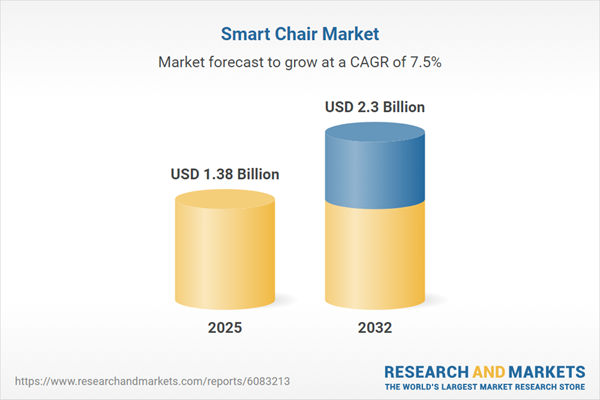Speak directly to the analyst to clarify any post sales queries you may have.
The smart chair market is undergoing significant transformation as technology-driven comfort and integrated wellness features become crucial to modern ergonomic seating. Decision-makers now recognize connected seating solutions as essential for supporting workforce wellbeing, productivity, and digital workplace evolution.
Market Snapshot: Smart Chair Market Size and Growth
The smart chair market achieved robust growth, rising from USD 1.29 billion in 2024 to USD 1.38 billion in 2025, and is projected to reach USD 2.30 billion by 2032 with a CAGR of 7.46%. Expansion is driven by greater focus on workplace wellness, advancements in smart healthcare solutions, and increasing adoption of connected home and office environments. Organizations across diverse sectors now seek seating that enhances both engagement and user wellbeing, while also aligning with enterprise digital transformation and optimized operational efficiency.
Scope & Segmentation: Comprehensive Overview
This report provides deep strategic insight across all dimensions of the smart chair market, segmenting by technology, application, and organization type to guide effective decision-making. Analysis highlights recent demand drivers, adoption patterns, and innovative opportunities shaping the sector. Coverage includes:
- Product Types: Smart chairs equipped with features such as climate control (heating and cooling), executive modules, gaming-focused designs, integrated massage, posture correction, and advanced recliners utilizing embedded sensors.
- Material Options: Options include breathable fabric and mesh for airflow, high-grade leather and faux leather finishes, ergonomic memory foam, sturdy plastic and metal frames, along with wood constructions integrated with electronic components.
- User Types: Solutions target commercial offices, private consumers, institutional purchasers, and government entities.
- Application Areas: Uses span automotive seating, education facilities, gaming and e-sports, healthcare and clinical settings, home offices, and collaborative integrated workspaces.
- Distribution Channels: Availability through direct retail, digital sales with interactive demo experiences, and rapid logistics systems for timely fulfillment.
- Geographic Coverage: Market analysis covers the Americas, Europe, Middle East, Africa, Asia-Pacific, and specific focus on North America, Latin America, Western Europe, and leading economies in Asia-Pacific.
- Corporate Coverage: Assessed companies include Autonomous Inc., Bionic Medizintechnik GmbH, ErgoHuman LLC, Haworth Inc., Steelcase Inc., Logitech International S.A., Razer Inc., and other notable innovators shaping the competitive landscape.
Smart Chair Market: Key Takeaways
- Technology integration, including embedded sensors, adaptive climate management, and seamless connectivity, is enabling organizations to align ergonomic seating with productivity goals and employee health priorities.
- Diverse product offerings allow for tailored solutions across sectors, elevating user experience in environments such as professional offices, educational institutions, healthcare facilities, and innovative entertainment setups.
- Material advances, such as adaptive surfaces, memory foam, and sustainable fabrication, address the increasing need for comfort, durability, and responsible sourcing in business procurement decisions.
- Partnerships between furniture manufacturers and electronics companies are accelerating the rollout of modular, smart seating options, supporting rapid response to evolving market needs.
- Emerging business models prioritize customization and data-driven insights, connecting smart seating to enterprise wellness programs and automated workspaces to maximize operational returns.
Tariff Impact: Navigating Cost and Supply Chain Shifts
Recent tariff adjustments in the United States have altered cost dynamics and procurement strategies within the smart chair sector. Leaders are responding by increasing nearshoring and establishing collaborations with local suppliers, aiming to counterbalance higher import duties on technological components. These strategies strengthen supply chain resilience, but require firms to refine pricing models, adjust logistics operations, and proactively manage inventory across North America, directly influencing bottom-line performance and delivery schedules.
Methodology & Data Sources
This analysis leverages a multi-stage research approach, blending comprehensive secondary research from market databases, industry publications, and regulatory reports, with targeted primary interviews of manufacturers, industry experts, key distributors, and end users. Validation through an expert advisory panel ensures insights are accurate and actionable for strategic planning.
Why This Report Matters
- Guides strategic planning by tracking trends and regulatory changes, equipping leaders to anticipate shifts in the smart chair market.
- Empowers investment, product development, and partnership decisions with clarity on technology adoption and geographic expansion dynamics.
- Delivers essential intelligence for adapting supply chains, pursuing sustainability, and leveraging emerging growth avenues to optimize organizational value.
Conclusion
This report identifies the core factors and opportunities shaping the smart chair market landscape. Decision-makers can apply these insights to position their organizations for sustained relevance and innovation-focused growth.
Table of Contents
3. Executive Summary
4. Market Overview
7. Cumulative Impact of Artificial Intelligence 2025
Companies Mentioned
The companies profiled in this Smart Chair market report include:- Autonomous, Inc.
- Bionic Medizintechnik GmbH
- BMB Medical Inc.
- Earthlite Medical
- ErgoHuman LLC
- FlexiSpot, Inc.
- GoodPosture LLC
- GREINER GmbH
- Haworth, Inc.
- Herman Miller, Inc.
- Kontor Furniture, Inc.
- Likamed GmbH
- Logitech International S.A.
- Nanning Passion Medical Equipment
- Noa & Nani Ltd.
- Paramount Bed Co Ltd
- PFHN Ventures, LLC
- Razer Inc.
- Secretlab Pte. Ltd.
- Serta Simmons Bedding, LLC
- Sihoo Ergonomics, Inc.
- Steelcase Inc.
- Tempur Sealy International, Inc.
- X-Chair, LLC
Table Information
| Report Attribute | Details |
|---|---|
| No. of Pages | 189 |
| Published | November 2025 |
| Forecast Period | 2025 - 2032 |
| Estimated Market Value ( USD | $ 1.38 Billion |
| Forecasted Market Value ( USD | $ 2.3 Billion |
| Compound Annual Growth Rate | 7.4% |
| Regions Covered | Global |
| No. of Companies Mentioned | 25 |









